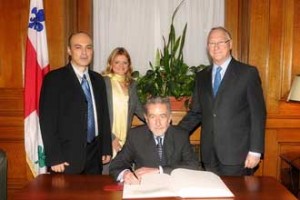
When the City of Montreal needed help, McGill was up to the task
By Pascal Zamprelli
“One of the things we hear constantly is that McGill is hiding behind the Roddick Gates, that it isn’t involved in the community,” said Dr. James Archibald, Director of Translation Studies at McGill’s Centre for Continuing Education. “And to my mind this is a good story because it shows clearly that there’s a viable link between our students and the community.”
Indeed, it’s quite a story.
In 2005, Montreal’s City Council adopted an important and innovative document: The Montreal Charter of Rights and Responsibilities. It serves the dual purpose of setting out the “deal,” so to speak, between the city of Montreal and its citizens, and of setting an example for other major cities, thus positioning Montreal as a leader, nationally and internationally.
The strategy seemed to work, as about two years after the Charter’s adoption, Michèle Bernier, a multilingual woman who advises the City on international relations, received a phone call from someone in Argentina who thought the Montreal Charter did a pretty good job of laying out what participatory democracy is all about, and might make a great model for cities in South America. Was there a Spanish version available?
There wasn’t, but it just so happened that Bernier was enrolled in Translation Studies at McGill, where the program includes opportunities to gain field experience whereby students get an opportunity to do some “real-life” translation together as a class. The Charter project seemed like a perfect fit for the advanced Spanish class, and Mayor Gérald Tremblay, for whom both the Charter and the idea of positioning Montreal in the world have been central priorities, was thrilled with the idea.
“We had Latin America wall to wall,” explained Dr. Archibald, including students from Argentina, Mexico, and Columbia. Two of the students were lawyers who could help ensure that any legal interpretation of the Spanish would be similar to that of the primary French text, and others were second and third generation immigrants who could provide crucial context, having lived in Montreal their whole lives. The lecturer, Daniel Zamorano, was himself from South America, where translation departments are typically housed in law faculties – so translating a charter of rights and responsibilities was right up his alley, too.
Receiving no compensation for their labour, the students had a different motivation. “It was done almost as a public service,” Dr. Archibald said, one that illustrates the relationship of Continuing Education’s commitment to serve “as a bridge to the community.”
In December, Mayor Tremblay invited the entire class to City Hall to celebrate its work. When Dr. Zamorano presented him with a leather-bound copy, Tremblay’s devotion to the Charter project was clear. “He held the Charter like it was his own baby and walked around for an hour holding the thing to his chest,” said Dr. Archibald. “He was like a happy father. It was palpable.”
The mayor took the time to speak with every student in the class, and was visibly emotional when addressing the group. “This is a Montreal story,” he said, invoking, as the Montreal Charter itself does in its preamble, the work of McGill Professor John Humphrey, who penned the original draft of the United Nations’ Universal Declaration of Human Rights in the 1940s. Dr. Archibald echoed these thoughts, reinforcing the
message that McGill is an important part of the Montreal dynamic.
Chatting privately with the mayor at the ensuing wine and cheese reception, Dr. Archibald suggested that, given demographic trends, it would not be long before another ethno-cultural community became Montreal’s largest. “I asked, don’t you think that it might be a good idea to do an Arabic version of the Charter? He looked at me and said ‘Right on, do it.’ So that’s the next project on the table.”
